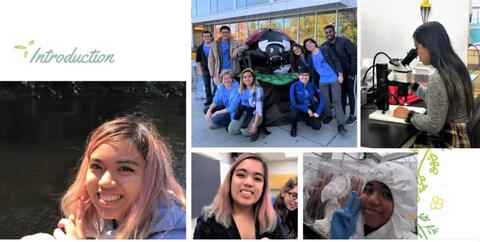Sabrina Celis has an insatiable interest in insects that she uncovered in her honors biology course at the Academy of the Holy Angels.
While growing up in Paramus, Celis visited Van Saun Park’s butterfly house, where various species followed her, attempting to get a closer look at the flower print dress she was wearing.
She was still considering her career options when current AHA Science Department Chair Patricia Prucnel prompted Celis to produce a brochure about the Queen Alexandra’s birdwing butterfly. Celis’s research helped her understand the impact of habitat loss and poaching and became a portal to the exciting field of entomology with encouragement from her teacher.
Celis recently spoke with current AHA students from Ms. Prucnel’s environmental science and honors biology classes. The budding entomologist presented “Beneficial Bugs,” an informative webinar that provided a look at the world’s most diverse group of animals.
She explained that she currently works in the spider behavior lab, where she researches why some spiders are solitary and others are social and work and hunt together.
Celis noted that insects are the world’s most important pollinators. Most food plants depend on insects for pollination, and many foods would not exist without insects. Insects also directly create numerous products that are valued by humans, including honey, silk, dyes, and venom that can be used for medications. Scientists also use insects to research issues related to behavior, neurobiology, physiology, and genetics.
She raised a few eyebrows when she commented that insects are nutritious food for humans. Celis discussed edible insects and products such as cricket flour and acknowledged that she has sampled a few types of insects.
Insects also aid forensic entomologists. Celis pointed out that insects are the first to arrive on any crime scene, and help investigators determine the site of a wound and when tissue began to decompose. Celis said insects are key to the decomposition process, which returns nutrients to the environment.
Insects are also a critical element in pest control. According to Celis, ladybugs are aphid predators and spiders defend against flying pests such as mosquitoes. She also spoke briefly about Integrated Pest Management, a holistic method of pest prevention that reduces the use of chemical pesticides.
As she concluded her presentation, Celis advised her audience to stay connected to their friends from Holy Angels and explore their interests while in college. Celis is president of Cornell’s Entomology Club and enjoys the University’s Insectapalooza festivals.
This spring, Celis will graduate from Cornell University with a degree in entomology. She plans to continue her education by pursuing a master’s in agriculture.
